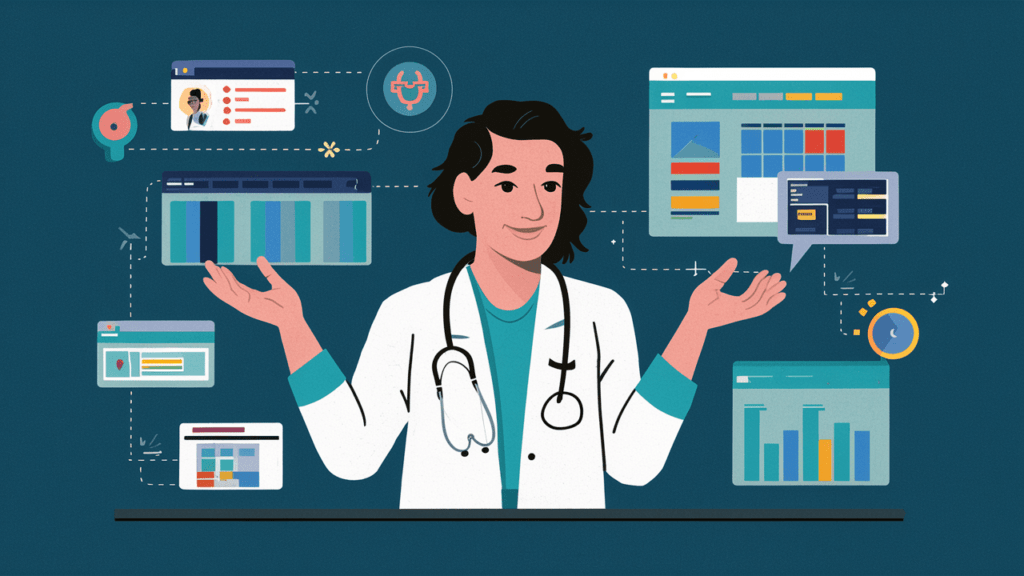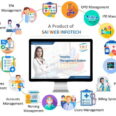Discovering the best healthcare software for small practices and top-rated medical software for medium practices is crucial for optimizing patient care and practice management. Small clinics benefit from user-friendly interfaces and appointment scheduling tools, while medium-sized practices require robust features like billing and invoicing, inventory management, and customizable templates. The benefits of healthcare software for small clinics are evident in streamlined operations, improved data security, and compliance. EMR systems designed for medium-sized practices offer scalable solutions, interoperability, and adherence to regulatory standards. When choosing healthcare software for small and medium practices, factors such as scalability, data security measures, integration capabilities, and training and support should be carefully evaluated to ensure seamless implementation and optimal performance.
When it comes to healthcare software solutions, small and medium-sized practices require tailored systems that cater to their specific needs. Here are some key benefits and features to consider:
Patient-Centric Approach
The best healthcare software for small practices prioritizes patient care with features like appointment scheduling, electronic health records (EHR), and patient portals for seamless communication.
Top-rated medical software for medium practices offers robust practice management tools, including billing and invoicing, inventory management, and reporting capabilities to optimize operations.
Efficient Practice Management
Customizable Templates
EMR systems for medium-sized practices come with customizable templates for different specialties, allowing providers to document patient information accurately and efficiently.
Benefits of healthcare software include interoperability with other systems and integration with labs, pharmacies, and billing services for streamlined workflows and data exchange.
Interoperability and Integration
Data Security and Compliance
Features of EMR systems include data security measures such as encryption, access controls, and HIPAA compliance to protect patient information and maintain regulatory standards.
Healthcare software solutions for small and medium practices offer scalability and flexibility to adapt to changing needs and accommodate practice growth without disruptions.
Scalability and Flexibility
Training and Support
Choosing healthcare software involves considering vendors that provide comprehensive training and ongoing support to ensure successful implementation and user satisfaction.

Healthcare software solutions encompass a wide range of technologies and systems designed to streamline healthcare delivery, improve patient outcomes, and enhance operational efficiency. These solutions include electronic health records (EHR) systems, practice management software, telemedicine platforms, medical billing and coding software, and patient engagement tools. They play a crucial role in modernizing healthcare practices, enabling seamless communication among healthcare providers, facilitating accurate patient data management, optimizing billing processes, and empowering patients to take an active role in their healthcare journey. Embracing healthcare software solutions is key to staying competitive, delivering high-quality care, and navigating the evolving landscape of healthcare technology.
Best healthcare software for small practices:
Small clinics thrive on efficient and patient-centric solutions. The best healthcare software for these settings offers intuitive interfaces, appointment scheduling tools, and electronic health records (EMR) systems, ensuring streamlined workflows and enhanced patient care.

Top-rated medical software for medium practices:
Medium-sized practices require robust practice management tools. Top-rated medical software caters to these needs with comprehensive features such as billing and invoicing, inventory management, customizable templates, and seamless integration with external services.

Benefits of healthcare software for small clinics:
Implementing healthcare software brings numerous benefits to small clinics. From improved patient care and streamlined operations to enhanced data security and compliance, the advantages are evident in every aspect of practice management.

Features of EMR systems for medium-sized practices:
EMR systems designed for medium-sized practices offer a plethora of features. Customizable templates for different specialties, interoperability with external systems, scalability, and compliance with regulatory standards are among the key features that drive efficiency and productivity.

How to choose healthcare software for small and medium practices:
Selecting the right healthcare software involves careful consideration. Factors such as scalability, user-friendliness, data security measures, training and support, and integration capabilities should guide your decision-making process to ensure a seamless transition and optimal performance for your practice.

conclusion
In conclusion, the realm of healthcare software solutions offers a myriad of options tailored specifically for small and medium practices. These top-rated solutions are designed to streamline operations, enhance patient care, improve data security, and optimize practice management.
For small practices, user-friendly interfaces, appointment scheduling tools, and electronic health records (EHR) systems play a pivotal role in ensuring efficient workflows and exceptional patient experiences. On the other hand, medium-sized practices benefit from robust features like billing and invoicing, inventory management, customizable templates, and seamless integration with external services.
The advantages of adopting healthcare software for small clinics and medium-sized practices are evident in the form of streamlined operations, improved data security and compliance, enhanced patient care, and cost savings. The ability to scale and adapt, along with comprehensive training and support, further enhances the value of these software solutions.
Choosing the right healthcare software involves evaluating factors such as scalability, data security measures, integration capabilities, training and support, and user feedback. By making informed decisions and embracing technological advancements, small and medium practices can elevate their operations, stay competitive, and deliver exceptional care to their patients.
Healthcare software solutions encompass a variety of technologies and systems designed to streamline healthcare delivery, improve patient outcomes, and enhance operational efficiency. These solutions include electronic health records (EHR) systems, practice management software, telemedicine platforms, medical billing and coding software, and patient engagement tools.
Healthcare software solutions offer numerous benefits to healthcare practices. They enable seamless communication among healthcare providers, facilitate accurate patient data management, optimize billing processes, empower patients to take an active role in their healthcare, and modernize overall operations.
There are various types of healthcare software solutions available, including:
- Electronic Health Records (EHR) systems for comprehensive patient data management.
- Practice Management Software for scheduling, billing, and administrative tasks.
- Telemedicine Platforms for virtual consultations and remote patient monitoring.
- Medical Billing and Coding Software for accurate billing and claims processing.
- Patient Engagement Tools for improving patient communication and involvement in care.
Healthcare software solutions can improve patient care by enabling healthcare providers to access and share patient information easily, reducing administrative burden, enhancing communication among care teams, facilitating timely interventions, and empowering patients with access to their health records and educational resources.
When choosing healthcare software solutions, it’s essential to consider factors such as scalability to accommodate practice growth, data security measures to protect patient information, integration capabilities with existing systems, user-friendliness for efficient adoption, training and support provided by the vendor, and compliance with regulatory standards.
Healthcare practices can stay competitive by leveraging healthcare software solutions to improve operational efficiency, deliver high-quality care, enhance patient satisfaction, reduce costs, increase revenue through optimized billing processes, and adapt to technological advancements in the healthcare industry.



[…] Electronic Health Records (EHR) […]